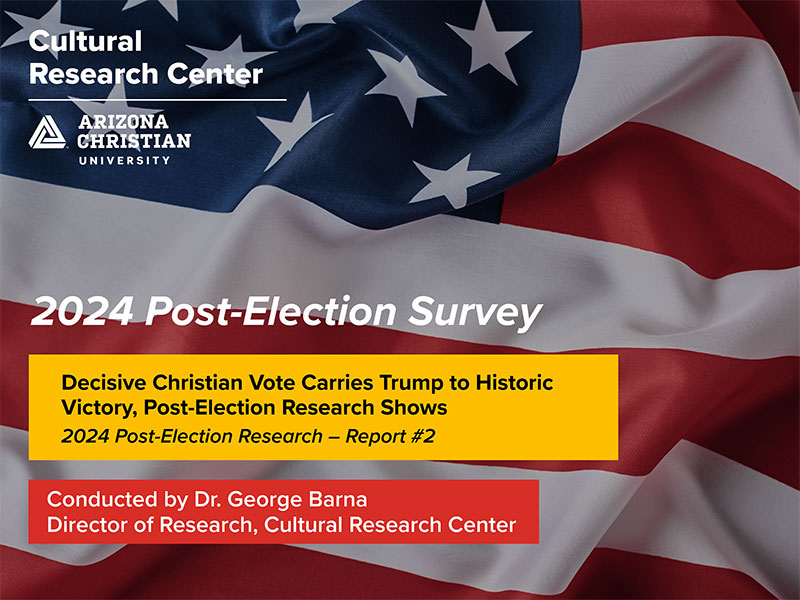RC Staff | November 14, 2024 |
From the Cultural Research Center at Arizona Christian University
Glendale, AZ (November 14, 2024) —New post-election research shows that Christian support was crucial in Donald Trump’s 2024 landslide victory, showing that Christians made up 72% of the electorate and gave Trump 56% of their vote.
In comparison, among people of other faiths or no faith, Vice President Kamala Harris was preferred with 60% of the non-Christian vote. Although Harris won a larger share of the non-Christian vote than Trump’s share of the Christian votes, Christians outnumbered non-Christian voters by more than a five-to-two margin—delivering the decisive Nov. 5 victory to President Trump.
According to the 2024 Post-Election Survey from Dr. George Barna and the Cultural Research Center at Arizona Christian University, among self-identified Christians, 56% voted. The findings show notable engagement from SAGE Cons (i.e. Spiritually Active Governance Engaged Conservative Christians), who held true to form and almost universally voted (99% turnout, repeating their 2020 level and eight points higher than their 2016 turnout), Catholics (70%), and those holding a biblical worldview (67%). However, turnout declined among those affiliated with non-Christian faiths and those without religious affiliation.
As expected, the post-election research shows that total voter turnout was low compared to 2020. Despite extensive campaign spending and media coverage, 45% of voting-age Americans abstained from voting, with only 55% of the voting-age population casting ballots, down from 62% in 2020, according to the research findings.
Earlier 2024 Pre-Election Research from the Cultural Research Center correctly predicted that turnout among Christians would fall below 2020 levels, but that potentially devastating impact for the Trump campaign was blunted by the even lower levels of turnout among the Harris campaign’s target segments.
In fact, close to one-half of the voting-age population (45%) chose not to bother voting, despite both parties as well as candidates in all states and at all levels of government engaging in record-breaking spending and extensive get-out-the-vote campaigns (GOTV).
The most common reason for not voting was lethargy. One out of five voting-age, self-identified Christians (20%) said they had intended to vote but simply forgot or never got around to it. There was a similar level of neglect among non-Christian adults, as one-sixth of them gave the same reason.
Still the turnout of Christian voters may seem surprising. As Barna noted, because of negative messages in the culture and in mainstream media, Americans often forget that two-thirds of adults in this nation consider themselves to be Christians.
“Even though very few American adults have a distinctively biblical worldview (just 4 percent),” he explained, “most adults have embraced basic principles and tendencies advocated by well-known Bible stories and teachings, attributes that have historically been building blocks of the nation.”
Barna said this widespread embrace of biblical principles among the American people is reflected in the election results.
“In the wake of last week’s election, we see that Donald Trump, for all of his perceived and ridiculed faults, did a better job of representing hallowed Christian characteristics such as family, rule of law, limited government authority, and financial responsibility,” he said.
“This is a strikingly clear contrast with Harris’s emphasis on abortion, open borders, and socialism— values many Christians found incompatible with their faith,” according to Barna.
Here are a few other key findings about Election 2024:
- Trump’s most concentrated Christian support came primarily from SAGE Cons (90% support for Trump), White born-again Christians (74%), and Pentecostals/ Charismatics (74%). What support Harris garnered in the faith community came largely from mainline and traditionally Black Protestant churches.
- Party identification among voters stayed constant since 2020, with 32% identifying as Democrats and 34% as Republicans. Support for socialism over capitalism also remained unchanged at 32%. Political engagement, however, dropped significantly, with only 44% of adults closely following politics in 2024, down from 58% in 2020, indicating reduced voter enthusiasm.
- Abortion figured prominently in the election. Support for unrestricted abortion grew among non-born-again Christians, with 24% identifying it as a vote-defining issue in 2024, doubling from 12% in 2020. In contrast, theologically-defined born-again Christians, especially from the Gen X and Baby Boom generations, largely opposed abortion on-demand; only 26% of Gen X and 24% of Boomers in this group supported unrestricted abortion access.
- For Christians, key concerns were inflation (38%), immigration (34%), abortion (20%), and democracy (16%). Theologically-identified evangelicals focused more than other people did on immigration (40%) and the war in Israel (12%). Catholics were relatively more concerned with abortion.
- People with no religious faith were focused on a different set of issues than were Christian voters. They were far more interested in candidate positions on abortion (35% versus 20% among self-identified Christians); protecting democracy and freedoms (24% versus 16%), and environmental policies (14% compared to 4%).
- Most voters did not spend much time investigating the details of the party platforms, candidates, and ballot initiatives before deciding how to vote. On average, voters invested about two hours figuring out who and what they would vote for. Almost one out of every five voters admitted to not having spent any time doing such research.
The research was conducted by the Cultural Research Center at Arizona Christian University, under the direction of Dr. George Barna. The survey, conducted during the three days immediately after the election, involved extensive interviews with a national sample of 2,000 voting-age adults.
The full report, “Decisive Christian Vote Carries Trump to Historic Victory, Post-Election Research Shows,” includes extensive analysis of U.S. voting trends, and digs deeply into church involvement, churchgoer preferences, and other patterns within America’s faith vote. It is available here.
2

